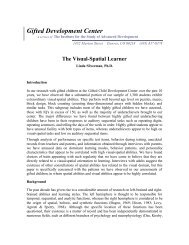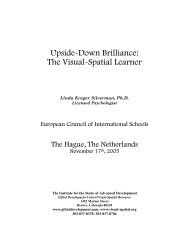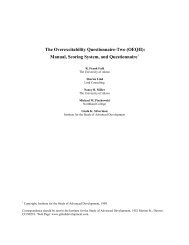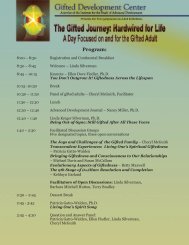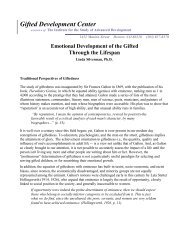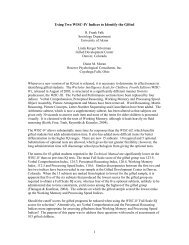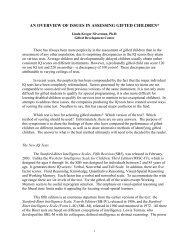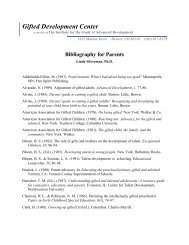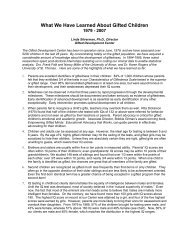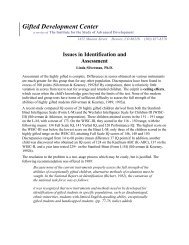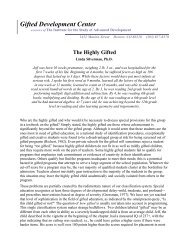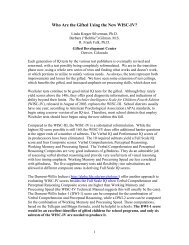THE CONUNDRUMS OF SUCCESS - the Gifted Development Center
THE CONUNDRUMS OF SUCCESS - the Gifted Development Center
THE CONUNDRUMS OF SUCCESS - the Gifted Development Center
Create successful ePaper yourself
Turn your PDF publications into a flip-book with our unique Google optimized e-Paper software.
Acknowledging that it is not always so, she never<strong>the</strong>less concludes that in general thisreflects <strong>the</strong> differences in <strong>the</strong> relationships parents often have with <strong>the</strong>ir children inchildhood. Mo<strong>the</strong>rs are still more likely to be <strong>the</strong> primary caregivers for very youngchildren. Thus <strong>the</strong>y have more opportunity to notice that <strong>the</strong>ir children are moving fasterthrough <strong>the</strong> early developmental stages than o<strong>the</strong>r children. But as Silverman notes, amo<strong>the</strong>r’s initial pleasure in her child’s development often begins to turn to uneasiness asshe sees that developmental differences are creating a distance between her child ando<strong>the</strong>rs of <strong>the</strong> same age. She may begin to worry about how her child will fit in at school,whe<strong>the</strong>r he or she will be lonely, what <strong>the</strong> teacher will do with a child who’s alreadyreading, what she as a parent should do. But in our society, it takes quite some courage toask <strong>the</strong> “g” question, “Is my child gifted?” Hence <strong>the</strong> relief when an expert says “Yes,your instincts are right”: now <strong>the</strong> mo<strong>the</strong>r has some definite starting point for finding outhow to help her child.Fa<strong>the</strong>rs on <strong>the</strong> o<strong>the</strong>r hand very often have a less intimate hour-by-hour contact with <strong>the</strong>irchildren during <strong>the</strong>se early years, and thus may have much less chance to see <strong>the</strong>minteracting with o<strong>the</strong>r children of <strong>the</strong> same age. They may not have <strong>the</strong> same opportunityto become so aware of differences in <strong>the</strong>ir children or of what those differences couldmean for <strong>the</strong>ir child’s adjustment to school. Thus if <strong>the</strong> question of giftedness is raised, afa<strong>the</strong>r – understandably – is more likely to fall back on his existing notions of whatgiftedness is, notions he shares with <strong>the</strong> rest of <strong>the</strong> community, of people doingextraordinary and outstanding things. Silverman interprets his reaction at this point asessentially a protective one. His child does not appear to be doing what he would thinkof as extraordinary and outstanding things. What if his child is put into a giftedprogramme and fails? In Silverman’s words, he worries that his child “may be set up forfailure – a life of unbearable pressures and false hopes.” So he may doubt <strong>the</strong> diagnosisand be hesitant about involvement in any special provision.Thus both parents are equally concerned for <strong>the</strong>ir child’s welfare and happiness, but eachis viewing this from a completely different standpoint. (Silverman, in press, pp 4-5).Remembering that Silverman herself points out that this is a generalisation, those of youwho are here today as parents may never<strong>the</strong>less find her comments interesting to reflecton in <strong>the</strong> light of your own experience and what you’ve observed in o<strong>the</strong>rs!Silverman’s observations of this significant difference led her to review <strong>the</strong> literature in<strong>the</strong> field, where, sure enough, she found that differences between masculine and feminineperspectives of giftedness become apparent even in <strong>the</strong> earliest writings on <strong>the</strong> topic. SirFrancis Galton, cousin of Charles Darwin and fa<strong>the</strong>r of <strong>the</strong> study of intelligence,published his seminal text Hereditary Genius in 1869. Based on his study of <strong>the</strong> lives ofeminent British men, mostly from wealthy families, this book established eminence – iehigh level performance – as <strong>the</strong> “quintessential evidence” of giftedness. In contrast, LetaStetter Hollingworth, who taught <strong>the</strong> first-ever course on <strong>the</strong> “Nurture and Needs of <strong>the</strong><strong>Gifted</strong>” at Columbia University Teachers’ College in 1922, rejected eminence as a usefulcriterion, and focussed her writings on <strong>the</strong> psychosocial development and adjustment9



